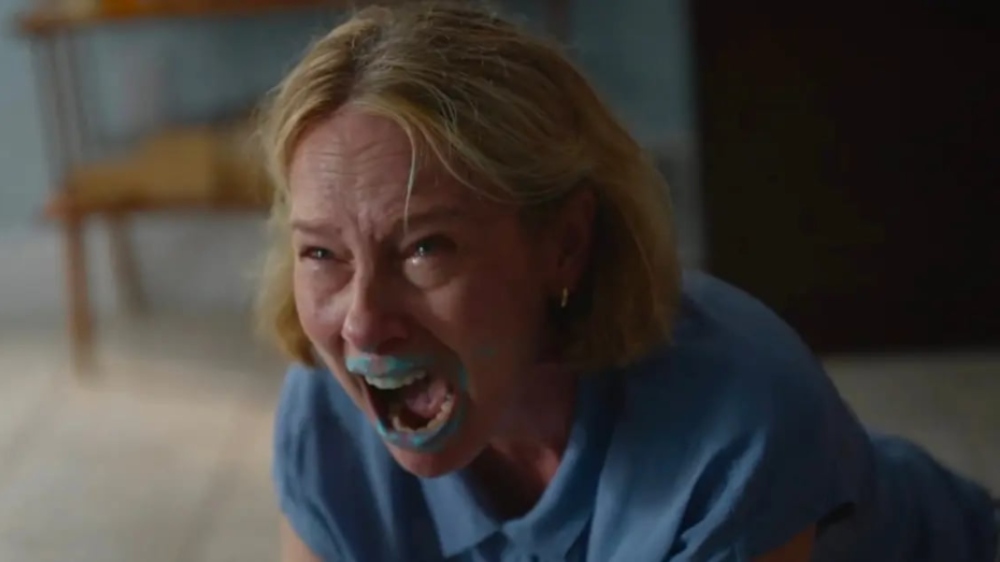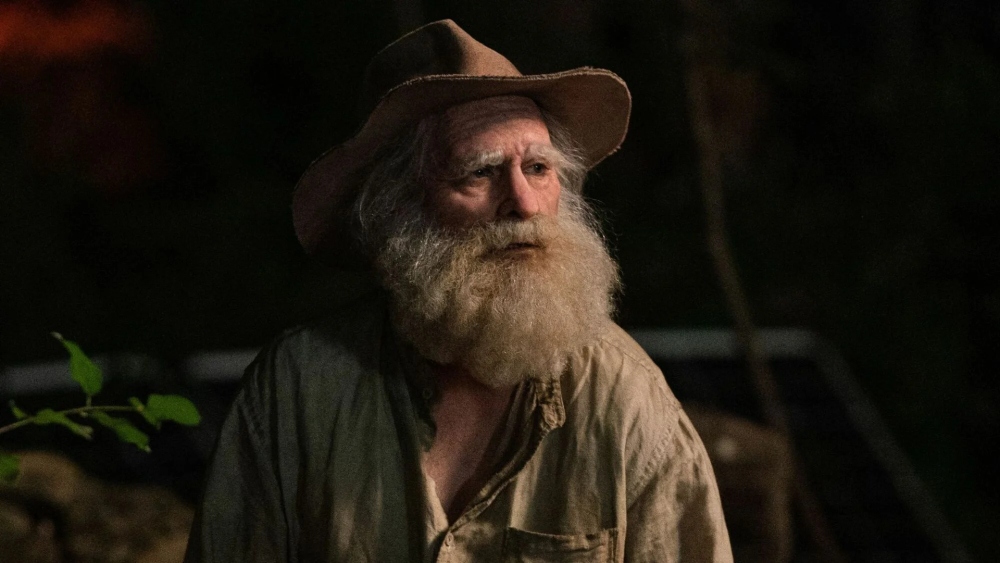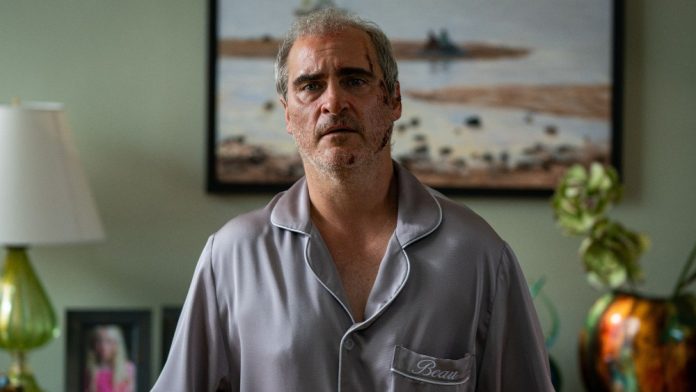In Ari Aster‘s third feature, Beau Is Afraid, the pathologically anxious Beau Wasserman (Joaquin Phoenix) sets out to visit his childhood home, only to find himself blown catastrophically off-course by a series of traumatic misadventures.
At first, Beau is summoned to mark the impending anniversary of his father’s death, though he’s delayed by his house keys disappearing and must inform his domineering mother, Mona (Patti LuPone), that he’ll miss his flight — a dreaded outcome, not for his own inconvenience but because of how she’ll react. When he soon after learns that Mona’s been decapitated by a fallen chandelier, Beau must travel nonetheless — to attend her funeral — if he’s to avoid upsetting her further. “A body is to be buried immediately,” her bulldog attorney (Richard Kind) insists by phone. “Every minute that we wait only deepens the humiliation.”
So begins an Oedipal guilt trip of epic proportions, especially given that Beau experiences the journey home as a panicked, picaresque-style odyssey, fleeing through one absurd nightmare scenario after another. Fear, as per the title, is the sensation with which Beau is most intimate; to wit, the film opens by showing his birth from his perspective, with his mother’s screams of horror accompanying his forcible ejection from her womb (“What’s wrong with him?” Mona cries out before a doctor delivers the first smackdown of Beau’s life).
In adulthood, though medicated by his therapist (Stephen McKinley Henderson), Beau cowers through his existence in a bombed-out ruin of an inner-city neighborhood, where the streets are overrun by looters, corpses, homeless people, trigger-happy cops, and tattooed maniacs. His deepest fears, however, concern his own cosmic culpability; Phoenix’s performance amplifies Beau’s inability to stop apologizing and his nonexistent self-esteem, as well as his need to avoid conflict at all costs despite the sense that he’s somehow the root cause of all the terrible things that are happening or could happen to him.
Embodying the symptoms of an extreme anxiety disorder, Phoenix isn’t playing a character so much as a human-sized mass of neuroses, but the film’s circumambulatory structure rarely allows him to modulate that performance below a fever pitch. Constructed to mirror this unwell character’s fundamental illogic rather than any outer reality, Beau Is Afraid shows us its character’s fraught hallucination of the world, not the genuine article; in doing so, it presupposes that all those terrible things that could happen indeed will, giving rise to the film’s unreal tone, which is an unfettered externalization of agonized neurosis, but it also asks the audience to question how seriously to take what they’re seeing.

With a slapstick sensibility and its funhouse mirror-style distortions of urban decay, the film’s opening hour is its most entertaining, conjuring all manner of walking horrors to surround and infiltrate Beau’s apartment while exaggerating each to self-parodic heights. Slightly amusing sight gags abound — a microwave “O’Loha” dinner promises the best of Hawaii and Ireland, while a neon “Erectus Ejectus” sign hangs outside Beau’s building — but most outrageous of all is Beau himself, inevitably forced to flee through the streets, naked and afraid, before he’s threatened, chased, run over by a truck, and repeatedly stabbed — as if the intricately populated Jacques Tati cityscape around him is hell-bent on revenge.
Awakening in a teenager’s bubblegum-pink bedroom, walls awash in K-pop memorabilia, Beau meets Roger (Nathan Lane) and Grace (Amy Ryan), a kindly couple who hit him with their truck, spirited him back to the suburbs, and plan to treat his wounds. Alas, he’s forced to flee again after being threatened by their killed-in-action soldier son’s best friend (Denis Ménochet), another charity case they’ve taken in — though not before their errant, pill-popping daughter (Kylie Rogers) forces him through a paralyzing drug trip that closes around Beau as yet another trap. This chapter of the film, set up to satirize the neoliberal family unit (Aster’s favored subject), feels strangely less assured and more frustrating than the preceding section; as Beau spends much of it zonked out in a corner, unable to flee this family’s sinuous generosity, the film’s pace slows to a meander, but this elongation is accompanied by scant psychological insight. Aster is more preoccupied with filling his frames with film references and guffaw-inducing jokes, resulting in an enervating sense of hyper-active torpor even before the section’s debt to the antiseptic domestic silos of Michael Haneke, and his cinematic manipulation Funny Games is made overt with the help of a television remote’s reality-breaking fast-forward button.
Escaping into the woods, Beau stumbles across a troupe of traveling actors who call themselves the “Orphans of the Forest” and transport Beau into the midst of their extravagant stage play. Here, with the help of Chilean artists and filmmakers Cristóbal León and Joaquín Cociña (whose 2018 stop-motion feature The Wolf House is a more visceral and artistically accomplished exploration of trauma than any Aster has managed to date), Beau Is Afraid steps outside of its cynically solipsistic vein of surrealism to more directly channel the semi-animated storybook aesthetics of Charlie Kaufman and Michel Gondry.
Dreaming of a life more fully lived than his own, Beau navigates a vast landscape of mountains and valleys, rendered with a fanciful swirl of painted backdrops, cardboard cutout houses, and animated snowstorms. Production designer Fiona Crombie, here and elsewhere, is the film’s saving grace, though cinematographer Pawel Pogorzelski makes its myriad digressions vivid and arresting, and editor Lucian Johnson hits a creative apex as well in stitching together the film’s blurring of actor and audience throughout this midsection.

From there, the film’s destinations are best left undiscussed, though Aster remains a gifted architect of interiors, and the family home — where Beau must confront his filial guilt and reckon with the matriarchal violence that has long dominated his life — is distinguished by an attic containing monstrous secrets and an open ledge that characters constantly near, at once recalling the shadowed family estate of Hereditary and the cliff that is so cunningly exploited in Midsommar. Aster replays such familiar sights to different tonal ends, replaying larger pet themes of familial trauma and mental illness for bitterly ironic gallows humor rather than gut-twisting horror. (This time around, the decapitated character gets an open-casket funeral, and LuPone’s comical mother-monster is afforded three scorched-earth monologues, each straining to level accusations as cruel as Hereditary‘s Toni Collette managed in one.)
Aster’s previous features concerned themselves with the simulacra of familial structure, one exploring the repressed traumas of a nuclear family as a vessel for evil and the other uncovering oppressive undercurrents in a pagan cult’s communal ethos. A ruthless and skilled puppeteer of his characters, Aster conceived of a dollhouse metaphor for Hereditary, orchestrating the destruction of his characters from outside their frame of reference, never allowing them to act autonomously or fully comprehend the horrors that befall them. There’s a sadism to this design, one that Beau Is Afraid both exposes and compounds through its added whiff of juvenilia as the blithely hateful outlook of a troubled child burning ants under a magnifying glass. Beau is most certainly afraid, and for good reason, but as he plunges through the multitude of phantasmagoric horrors Aster has devised for him, the maximalist nature of the character’s Job-like suffering, and Aster’s disinterest in exploring his humanity alongside it, grows tiresome and off-putting.
Though funny in a self-conscious, scattershot way, the sketch-like progression of Beau Is Afraid only feels more conspicuously immature as the film nears an indulgent three-hour runtime without accumulating any relatable human element or even developing its main character’s inner life. Beau exists more as a glutton for punishment, as an avatar for the film’s hazily unformed concepts of filial failure and abuse, and as a mean-spirited practical joke than as a flesh-and-blood protagonist worthy of our time and investment. The film’s emotionally stunted perspective may reflect its character’s own arrested development, but the ploddingly one-note nature of its narrative also signifies an absence of imagination on Aster’s part.
Leaving Beau Is Afraid, I had no doubt that Aster has watched a great many movies — the film’s finale splits the difference between The Trial and Defending Your Life without capturing the alchemical substance of either’s tone or finding a satisfying end note for his own story — but with more resources at his disposal than ever before, Aster has emerged with his most impersonal work to date: a shallow simulation of a magnum opus, filled mainly with flourishes but missing the vital spark of life that animates all its countless, superior inspirations.
Grade: D+
Beau Is Afraid is now playing in theaters nationwide courtesy of A24.



